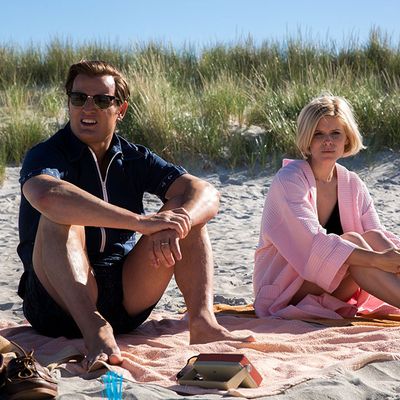
Is there any actor who has found his moment more succinctly than Jason Clarke in the past year? The movies have had more job openings than usual for second-string alpha males that find themselves bedeviled by a world that is no longer under their thumb, and Clarke, with his cartoon superhero chin and tightly wound-up mouth, is decentralized masculinity incarnate. He’s turned in underrated performances as bad husbands in Mudbound and (the equally underrated) All I See Is You; he excels as villains that think they’re the heroes of the story. Thus, there’s no part that seems more tailored to his strengths than Ted Kennedy in director John Curran’s graceful Chappaquiddick.
A retelling of the eponymous incident that rocked, but notably failed to derail, the youngest Kennedy brother’s political career, Chappaquiddick is somehow both cynical and deeply inquisitive about the morals of every character involved. It trusts a roomful of entitled men to make the right decision, so that when they don’t, every dimension of their thoughtlessness is felt. Writers Taylor Allen and Andrew Logan are not merely satisfied to tell a WASP-porn, Vanity Fair-esque soap opera of regattas and manslaughter, nor is it merely a gimlet-eyed examination of the precedent-setting image-making and media-wrangling of the late 1960s, but the film is pretty skilled at being both.
For those who need to brush up on their Kennedy lore: On the night of July 18, 1969, after a get-together of some close friends and trusted former staffers of the late Robert Kennedy’s presidential campaign on Chappaquiddick Island, Massachusetts, Senator Ted Kennedy left with 28-year-old Mary Jo Kopechne in his 1967 Oldsmobile. Kennedy lost control of the car and drove it off a small, unguarded bridge into a shallow canal; he escaped but Kopechne did not, and her body was found the next morning. There was already enough to side-eye about the young senator out for a late-night drive with a woman who was not his wife (and Chappaquiddick mostly leaves it at a side-eye); more damning was his failure to report the incident for ten hours, and his lack of an effort to rescue her, despite autopsy reports that she may have lived for up to two hours in the submerged car.
There’s a shadow over sunny Martha’s Vineyard from the outset. The family and their circle are still reeling from Bobby’s assassination, and Kopechne herself (Kate Mara) is a haunted figure when we meet her sunbathing on the beach, traumatized by what had been a tumultuous start to her promising political career. Nobody seems particularly energized to get Ted’s 1972 presidential bid off the ground, but they dutifully go about the early stages, with Kennedy cousin and all-purpose sidekick Joe Gargan (Ed Helms) most dutiful of all. It’s easy to feel like the death of Kopechne was an act of God, slapping down the last hope for another President Kennedy before it even had a chance. But Curran’s film is less about operatic curses and fate than it is about human weakness.
At the heart of this is Clarke’s performance as a man too uncertain of himself to be president, but whose uncertainty about himself is one of his only redeeming qualities. Throughout the film Gargan is Ted’s moral compass, who insists that truth will set him free, while his domineering father, Joe (Bruce Dern), no less tyrannical after suffering a stroke, makes it clear than anything less than a full denial and a 360-degree alibi will have him disowned as a son. Caught between two moral extremes, but also fatally self-involved, Ted shoots himself in the foot by committing to neither strategy; he writes a 95 percent honest Gargan-approved police statement, and later contradicts it with a prime-time televised statement. He chalks up the inconsistencies to a fabricated concussion, but the experience of being Ted Kennedy in 1969 seems plenty impairing without the head trauma.
Chappaquiddick is the kind of movie that could never be made while its subject was alive, which of course is the only reason it was worth making. Though the film goes into rich, often darkly absurd detail about the truth-massaging that ensued after July 18, none of it is at the expense of a sober portrayal of Kennedy and all his shortcomings in that moment of history. But rather than simply point out that the famous man did a bad thing, Clarke’s Kennedy is something more elemental, a snapshot of a failure of all the things masculinity was and to some degree is still billed as. He didn’t save the girl, he couldn’t win the race, and he let an old man boss him around. The film feigns some shock at how little this affected his long and largely successful career. But no matter how immune you are to Kennedy nostalgia, it’s hard not to feel a little wistful about a time when that was even a fear.

